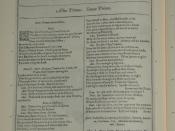As Act 5, Scene 2 is the scene where Cleopatra dies; Shakespeare needed to make this scene dramatic in order for one of his eponymous characters to truly reflect the grand life she led. He does this by providing characters for her to interact with so that the audience can know her thoughts, but also by setting aside large chunks for her to soliloquise, so that the change in her personality can be noted since Antony's death.
The passage of Act 5, Scene 2 begins with Cleopatra remarking, "What poor an instrument may do a noble deed!" when she is told the Clown bringing her asps has arrived. The comment may refer simply to the Clown who is obviously lower status to Cleopatra, and her remarking that she has to stoop to his level so that she can be reunited with Antony by killing herself with what the Clown brings.
Her derogatory comments to people of lesser status also occur in 1,5 where she says to Alexas, "How much art thou unlike Mark Antony!"
What the Clown brings is a basketful of asps that will be able to fulfil Cleopatra's "noble deed" of committing suicide. This was the "noble" way of death for Romans, and so Cleopatra's exit from the world will be seen as noble by Antony. In other words, it is the ultimate sacrifice of her life, as she not only kills herself so that she can be with him, but also recognises that she would be honouring him by committing suicide.
However, Cleopatra is known for her bawdy humour and tendencies to talk in innuendoes, and the word "instrument" can often be used in a phallic way. This goes in hand with the fact that the asps are being brought to Cleopatra in a basket of figs,


